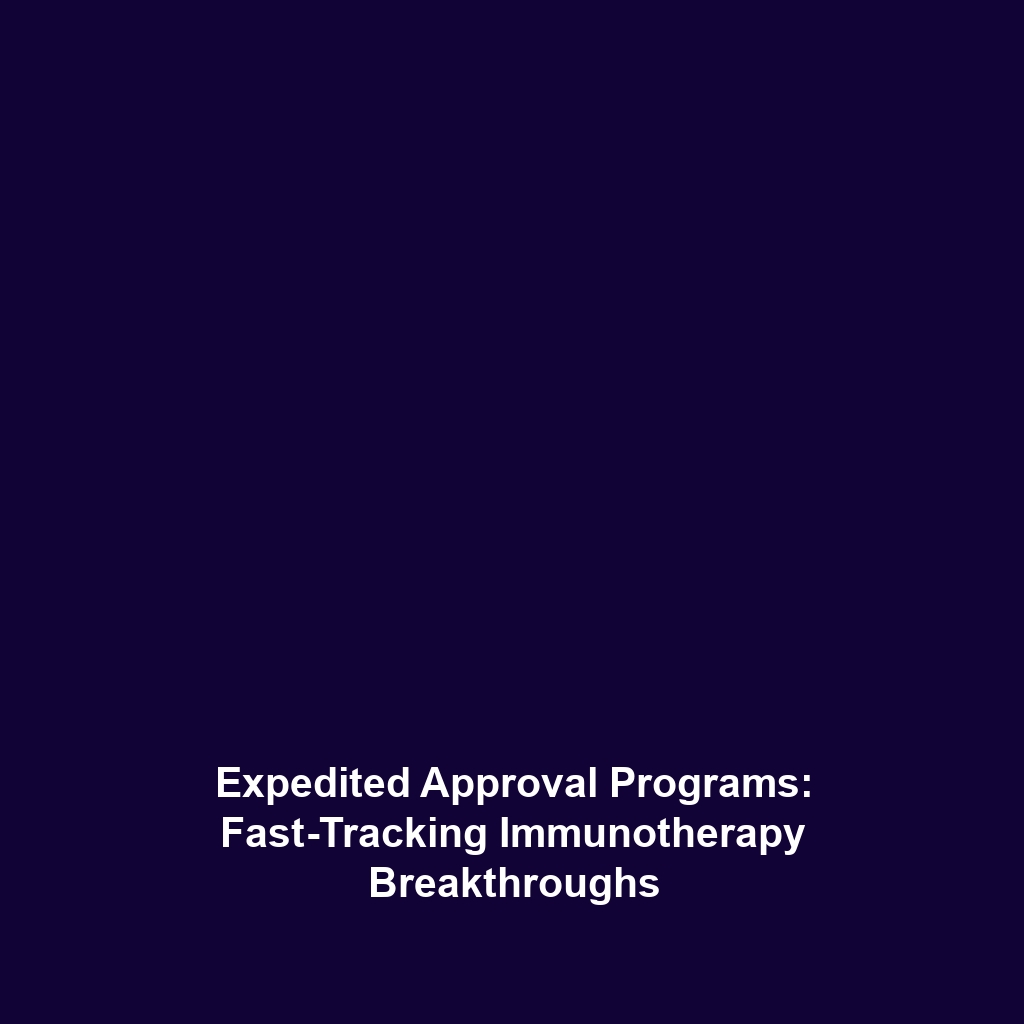Expedited Approval Programs in Immunotherapy & Cancer
Introduction: Expedited approval programs, particularly the Breakthrough Therapy Designation (BTD), play a pivotal role in the advancement of immunotherapy for cancer treatment. These programs aim to expedite the development and review of drugs that demonstrate significant potential in treating serious conditions. With cancer being one of the leading causes of death worldwide, the timely approval of innovative immunotherapies is essential for improving patient outcomes. This article delves into the significance of expedited approval programs, their concepts, real-world applications, challenges, and future research directions within the realm of immunotherapy and cancer.
Key Concepts
The Breakthrough Therapy Designation is a part of the expedited approval programs initiated by the U.S. Food and Drug Administration (FDA) to facilitate the development of therapies that offer significant benefits over existing treatments. Key concepts include:
- Eligibility Criteria: To qualify for BTD, a therapy must demonstrate preliminary clinical evidence indicating that it may treat a serious condition and have substantial improvement over available therapies.
- Accelerated Approval Pathway: BTD aids in fast-tracking the approval process by allowing more effective communication between drug developers and regulatory agencies.
- Real-Time Review: Continuous feedback during clinical trials enhances the development timeline and encourages innovative research in the field of immunotherapy.
Applications and Real-World Uses
The applications of expedited approval programs like BTD in immunotherapy and cancer treatment are vast and impactful. Notable examples include:
- Monoclonal antibodies such as Pembrolizumab (Keytruda), which gained BTD for its effectiveness in several cancers, including melanoma.
- CAR T-cell therapies, which represent a groundbreaking advancement in treating certain blood cancers, benefiting from expedited processes to bring treatments to patients quickly.
- Novel checkpoint inhibitors showing promise in early clinical trials that are rapidly moving to larger studies due to their BTD status.
Current Challenges
Despite their benefits, several challenges exist regarding expedited approval programs:
- Clinical Evidence Gaps: The need for robust data to support claims of significant improvement can delay approvals.
- Post-Marketing Surveillance: Ongoing monitoring of therapies post-approval can be resource-intensive and raises concerns about long-term efficacy and safety.
- Equity in Access: Disparities in access to state-of-the-art therapies can arise from reliance on expedited pathways, potentially exacerbating health inequities.
Future Research and Innovations
Looking forward, several innovations are anticipated in expedited approval programs:
- AI-Driven Drug Development: The use of artificial intelligence to analyze clinical data may speed up the identification of promising immunotherapies.
- Next-Generation Biologics: Ongoing research into novel biologics could lead to new breakthroughs that warrant expedited review due to their potential impact on patient care.
- Combination Therapies: Studies on combining immunotherapies with other modalities may yield promising results, prompting expedited approval considerations.
Conclusion
Expedited approval programs, such as Breakthrough Therapy Designation, are vital in advancing immunotherapy for cancer treatment. They not only enhance the approval speed of innovative therapies but also improve patient access to groundbreaking treatments. As research advances, it is crucial for stakeholders to navigate the challenges posed by these programs while fostering an environment conducive to innovation. For further reading, explore our articles on related topics such as current innovations in immunotherapy and the future of cancer treatment strategies.

Leave a Reply